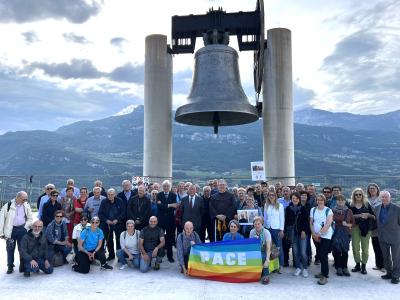The Custos of the Holy Land greeted the march for peace organized by the Association of Franciscan Missions of Trento
The Custos of the Holy Land, fra Francesco Patton, greeted the participants of the march organized by the Association of Franciscan Missions of Trento in Rovereto (Italy) on 24 May.
The meeting was in the place where During the First World War there was the front and where today there is the large Bell of the War Dead, made 100 years ago. “I will take this rope, the symbol of your march, to Jerusalem, to Gethsemane” he said, emphasizing the deep connection between the two places: “The Church of the Nations is a symbol of the commitment to peace after the First World War, just as the Bell of the War Dead of Rovereto was produced with the bronze of the cannons of the armies that had faced each other in that war.”
Steps for peace
The event was part of a wider initiative “Steps For Peace”, promoted by the “Economy of Francesco” movement. It is a sort of “pilgrimage in parts”: by adding together the steps of all the participants, the aim is to ideally cover the distance between Assisi and Jerusalem (almost four thousand kilometres), in memory of the journey made 800 years ago by St Francis who, unarmed, arrived at the gates of Cairo to meet the Sultan, Malik al-Kamil.
“Thank you for your testimony,” the Custos added. “Your steps, together with those of all those who will be walking in the name of peace all over the world, are a pointer and a commitment against every war, even when this seems a difficult and prohibitive journey.”
The steps of the march
The march started from the Town Hall Square in Rovereto and reached the top of the Hill of Miravalle, where the remains of the trenches, from where Italian and Austro-Hungarian soldiers faced one another at a distance that at times was only a few dozen metres, can still be seen.
Going up towards the Hill, the participants (about fifty people of all ages) stopped near a small fountain on the road. Here, between the two enemy lines, between Christmas 1915 and May 1916, the soldiers on the two sides – with different languages and uniforms – would come and draw the water, suspending their rivalry, rendered “brothers” for a second by their common need.
The march then passed by the large building of the Ossuary – in which the mortal remains of some twenty thousand soldiers from both sides are kept. After a steep path in the wood, dedicated to the Nobel Prize for Peace, the march arrived at the Bell of the War Dead which, every evening at 9.30 p.m., recalls, ringing one hundred times, all the victims of the war and is a reminder of the commitment to peace.
By Giorgio Lunelli | custodia






